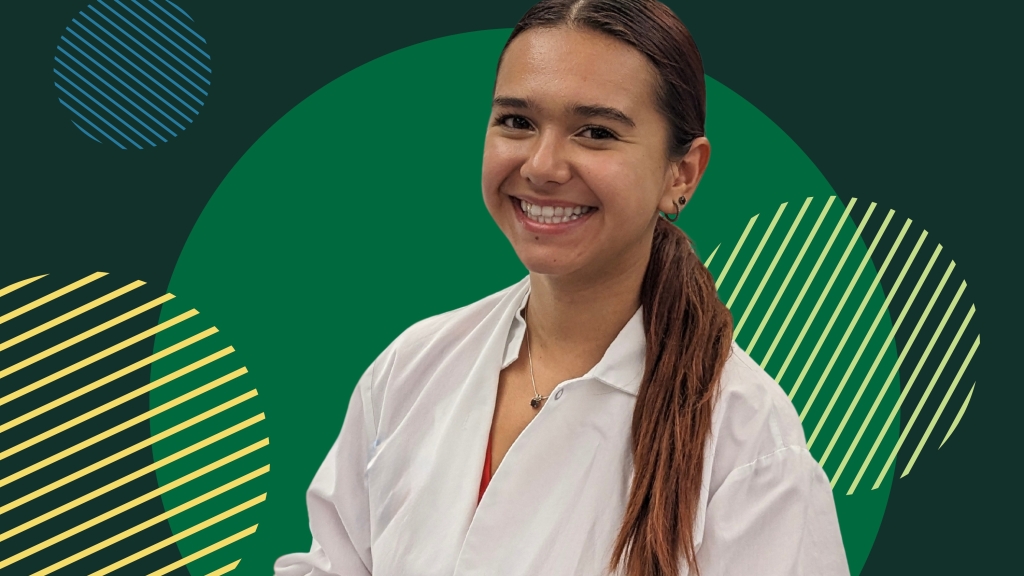When Victoria Ruiz '26 was growing up in Tijuana, Mexico, she loved spending time with her father in his attic workshop. Trained as a plumber and handy with spare parts, her Texas-born dad loved making everything from light fixtures to garden beds, and his enthusiasm was contagious.
"On the weekends, as soon as I woke up, I knew my dad was going to be up there, so I would run out before breakfast to be with him. Seeing him do construction really got me into building a lot of things," Ruiz recalls.
Sadly, Ruiz lost her father to a lung condition at an early age. When she was in fourth grade, she and her mother moved to California. Neither spoke English, and Ruiz had to teach herself a language that seemed, at the time, more complex and difficult than mathematics.
"Numbers are just numbers, no matter the language," she says. "I think that drove me into STEM, because it was easier to communicate through numbers than words."
Nevertheless, Ruiz became fluently bilingual. At Dartmouth she has served as an event and media assistant for the Department of Spanish and Portuguese and as a language drill instructor, helping other students develop conversational skills in Spanish.
Her biomedical research interests are rooted in personal experience. Inspired by her mother's struggle with late-stage rheumatoid arthritis and osteoarthritis, Ruiz is a research assistant at Thayer School of Engineering, majoring in biomedical engineering with a minor in Hispanic studies.
Last summer, while taking an introductory engineering class, Ruiz developed a prototype for a water-powered, ergonomic handheld shower head and scalp massager for arthritis patients to reduce joint pain and fatigue during hair washing. She has also conducted medical device testing with Boston Scientific as a urology research and development intern and supported pre-clinical gene therapy research at Navega Therapeutics in California as a lab technician intern.
Working in the Dartmouth Biomedical Engineering Center for Orthopaedics with Douglas Van Citters '99, Thayer '03, '06, she's now part of a team investigating how and why hyperbaric oxygen treatment can help heal wounds and strengthen bones.
"We work in vitro, not animal models, and what we've seen is that hyperbaric oxygen treatment can actually help proliferate cells," Ruiz says. "You do what's called a scratch assay on them, to see how fast the cells are able to close that gap."
This and other projects have earned Ruiz much recognition. She was one of four students in her class to be selected as a prestigious Coulter Scholar last summer, a distinction recognizing exceptional academic promise and commitment to increased access in STEM. The program, designed and run by the Scholars Programs team in Undergraduate Advising and Research, launched last fall and supports students with community networks and experiential research funding.
Ruiz also received a Clare Boothe Luce Scholar grant, given to undergraduate women to help close the gender gap in STEM disciplines and across leadership roles in higher education. She has co-chaired People of Color in the Outdoors, a sub-club of the Dartmouth Outing Club, and is co-president of Dartmouth's chapter of the Society for Hispanic Professional Engineers (SHPE).
"We have events just to socialize, and we also work together on our LinkedIn profiles, share interview tips, and learn how to apply to graduate programs—things many people from insufficiently represented groups don't have first-hand experience with," says Ruiz. "I want to go to graduate school but I don't know exactly how to get there, and talking to other students and attending panels is really helpful."
Ansley Booker, the Penny and Jim Coulter 1982 Executive Director of Dartmouth NEXT, says Ruiz is an ideal scholar because she seizes every opportunity to share what she learns.
"Victoria embodies the spirit of academic excellence, altruistic research, and servant leadership," says Booker. "She is invariably finding ways to broaden the participation of all students through her educational outreach with programs such as SHPE, Coulter Scholars, and Dartmouth Bound. At our annual undergraduate Karen E. Wetterhahn Science Symposium, I was captivated by her passionate presentation of her research project, Effects of Hyperbaric Oxygen Therapy on Osteoblast-Like Cells: Implications for Bone Healing."
As her research grows ever more advanced, Ruiz says she still remembers what a thrill it was, being the very first student in her high school to apply and get a full-tuition scholarship to a selective private college. That’s why, as a peer mentor for UGAR's Scholars Programs cohort, she wants to help others succeed.
"I meet with my mentee from the Class of '28 all the time, and have brought her into the lab. It's a good way to grow our STEM pipeline," she says.
Compassionate mentoring comes naturally to Ruiz, because even though she was her high school class valedictorian, she arrived in Hanover feeling unsure about her chance for success in a highly competitive Ivy League environment, says Jay Davis '90, director of the First Generation Office and assistant dean of undergraduate students.
"She has faced varied challenges as a first-generation and low-income student living 3,000 miles from family, which makes all the more impressive her ability to focus so effectively on making the most of her Dartmouth opportunity," says Davis. "Victoria is a delight, with a remarkable ability to connect with people across difference. Her amazing work ethic inspires others. Simply put, she exemplifies the best of Dartmouth."
